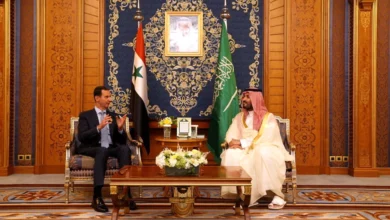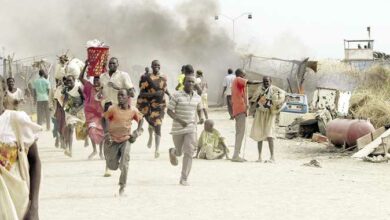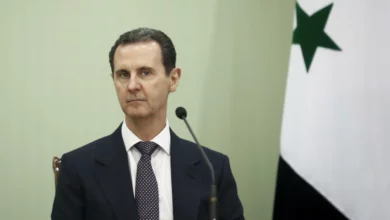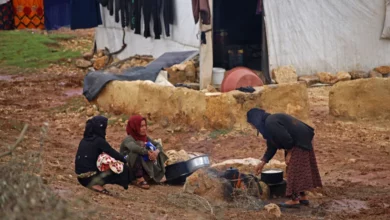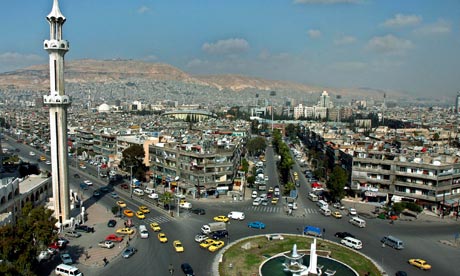
Two loud explosions targeted one of Syria's top military command buildings in the capital Damascus on Wednesday, engulfing the building in flames, residents and state television said.
They said the explosions struck the General Staff Command Building (Hay'at al Arkan) in the Umayad Square in central Damascus, which is one of the top military headquarters in the country.
There was no immediate word on casualties but ambulances could be heard racing to the sealed-off area.
The Syrian information minister said the attack had caused "only material damage" and that security forces were chasing "armed terrorists" — a term the authorities use to refer to insurgents waging a violent uprising to oust Syrian President Bashar al-Assad.
Gunfire and other smaller blasts could be heard after the explosions, as well as the sound of ambulance sirens. Many roads in the center of the capital were blocked, residents said.
The explosions were heard around 7:00 am local time, before regular working hours start in Syria.
"The explosions were very loud. They shook the whole city and the windows of our house were shuddering," one resident reached by telephone said.
"Black smoke was seen rising from the area near the army staff building," the resident, who declined to be named, said.
A Damascus bomb attack on 18 July killed several top security officials, including Assad's brother-in-law, the defense and interior ministers. That attack paved the way for a rebel advance into the center of the capital, although they have since been pushed back to the outskirts.
Major strike?
Another resident said: "I was woken up at four minutes to seven by the first loud explosion. Five or six minutes later there was a second."
"We're used to the sound of artillery but these were very big — bigger than usual. I can hear gunfire still," he said, speaking an hour and a half after the blasts.
He said one of the blasts appeared to have been in the area of the General Staff Command.
He said he could see soldiers stationed on the roof of the nearby Air Force Intelligence building.
Syria's conflict, once a peaceful protest movement, has evolved into a civil war that the UN special envoy to Syria, Lakhdar Brahimi, said was "extremely bad and getting worse." He said the stalemate in the country could soon "find an opening," without elaborating.
Even Damascus has become a battleground between Assad's forces and opposition fighters.
Activists say more than 27,000 people have been killed in the 18-month-old uprising against Assad.
With no foreseeable prospect of foreign intervention and diplomacy stuck, outgunned rebels have relied increasingly on attacks with homemade bombs, striving to level the playing field against a state using fighter jets, artillery and tanks.
At the annual UN General Assembly in New York, French President Francois Hollande sought to shake up international inertia over Syria's crisis by calling for UN protection of rebel-held areas to help end Syria's bloodshed and rights.
"The Syrian regime … has no future among us," Hollande said in a speech. "Without any delay, I call upon the United Nations to provide immediately to the Syrian people all the support it asks of us and to protect liberated zones."
Protection zones
Protection for "liberated" areas would require no-fly zones enforced by foreign aircraft, which could stop deadly air raids by Assad's forces on populated areas. But there is little chance of securing a Security Council mandate for such action given the continuing opposition of veto-wielding members Russia and China.
The United States, European allies, Turkey and Gulf Arab states have sided with the Syrian opposition while Iran, Russia and China have backed Assad, whose family and minority Alawi sect have dominated the major Arab state for 42 years.
But Western powers have shied away from supplying military aid to the rebels to an extent that could turn the tide of the conflict, in part out of fear of arming Islamist militants who have joined the anti-Assad revolt.
In another speech to the General Assembly, Qatari Emir Sheikh Hamad bin Khalifa al-Thani said Arab nations should intervene in Syria given the Security Council's failure to stop the civil war.
Qatar, which backs the rebels, called on big powers to prepare a "Plan B" within weeks and set up a no-fly zone to provide a safe haven inside Syria in case international mediator Lakhdar Brahimi fails to make headway.
The Qatari emir said he believed Arab and European countries would be ready to take part, despite their public wariness of committing the forces needed for such a mission.
Addressing the General Assembly, US President Barack Obama accused Iran of helping keep a dictatorship in power in Syria.
"Just as it restricts the rights of its own people, the Iranian government props up a dictator in Damascus and supports terrorist groups abroad," Obama said in a reference to Assad.
"We again declare that the regime of Bashar al-Assad must come to an end so that the suffering of the Syrian people can stop, and a new dawn can begin."
The British-based charity Save the Children released a harrowing report about abuse of Syrian refugee children.
Khalid, 15, said he was hung by his arms from the ceiling of his own school building and beaten senseless. Wael said he saw a 6-year-old starved and beaten to death, "tortured more than anyone else in the room."
UN investigators say Syrian government forces have committed human rights violations "on an alarming scale," but have also listed multiple killings and kidnappings by armed rebels trying to oust Assad after 12 years in power.
The children that Save the Children spoke to in refugee camps in neighboring countries said they had witnessed massacres and seen family members killed during the conflict.
Humanitarian conditions are worsening as the violence drags on. The president of the Syrian Arab Red Crescent, which has been the only relief group on the ground the entire 18 months of conflict, said it was in dire need of supplies.
"We need to concentrate mostly on health and shelter because there are 1.5 million displaced people," Abdul Rahman Attar told Reuters during a visit to Oslo. "We need more of everything."

